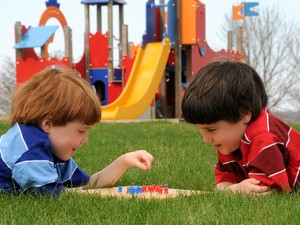Turn taking games – Child
 Turn taking games can help children develop important social-emotional skills including self regulation.
Turn taking games can help children develop important social-emotional skills including self regulation.
Did you know?
Turn taking is a valuable skill for making friends, waiting, being patient, negotiating and problem solving. Children need opportunities to practice turn taking.
Using a sand timer, singing a song or counting to ten can be useful in helping children predict when their turn will start or end. This helps develop a sense of fairness in a tangible way children can understand.
Add language
Talking about their own and other people’s feelings, rules and how to play fairly e.g. taking turns and waiting for your turn, all help to provide the language for these concepts. This helps your child develop the vocabulary for negotiating and problem solving in social situations.
Look for books to share that include turn taking lessons as part of the plot line. They can help as ways to talk about being fair, taking turns and feelings.
Other development
Physical outdoor games like ball catching or kicking, shooting hoops and chasey are great turn taking games that also develop coordination and motor skills.
Indoor play with board games, cards and memory games are wonderful for practicing taking turns and to win and lose with games. Children need to win and lose frequently to learn how to handle both triumphs and disappointments in life. This builds their resilience skills and helps them develop and practice self-regulation. Adults can model how to be a good sport.
Board games usually also include some type of strategy, counting, colour matching and following rules. These all help develop important cognitive skills which will be needed at school. Match the board game to your child’s level of development (use the age range on the packaging as a guide).
Across the ages
All the activities listed on our “Play Ideas” page can be applied across different age groups. Check out turn taking games for babies, toddlers and playgroups.
Activities listed under “child” are suitable for children 3 years and older. Children of this age enjoy more complex activities where they can develop their skills and use their imagination while playing with friends.

